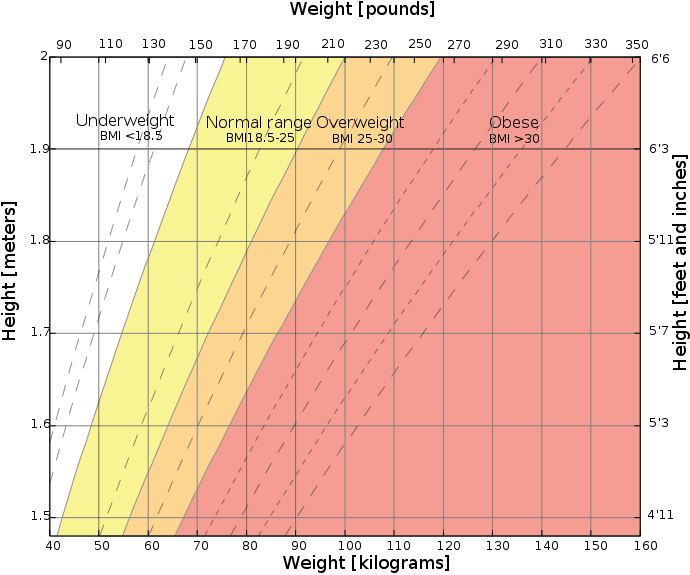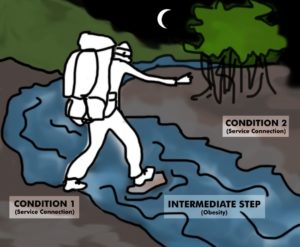Obesity and VA Disability Compensation

CCK Law: Our Vital Role in Veterans Law
Getting VA disability compensation for obesity is a complex issue that VA, veterans’ advocates, attorneys, and the courts are still working through. With new medical evidence coming out about obesity, its causes and its effects, we look at how veterans can be compensated if their service or service-connected disabilities led to obesity.
According to “VA/DoD Clinical Guideline for Screening and Management of Overweight and Obesity,” a publication from VA that offers guidelines and practices for health professionals, 78% of veterans are overweight or obese. Obesity is clearly an issue many veterans experience, and some attribute their obesity to their service, or to a service-connected disability. So how can they be compensated?

Background: What Is Obesity?
According to the Centers for Disease Control and Prevention (CDC), a person is considered to be overweight or obese if they have a “weight that is higher than what is considered as a healthy weight for a given height.” This standard of a healthy weight is determined through the use of Body Mass Index, or BMI. (Check out the CDC’s Adult BMI Calculator here.) BMI takes a person’s weight in kilograms, and measures that against the person’s height. BMI on its own is not a comprehensive indicator of obesity as it fails to take into account the overall health of the individual, as well as levels of body fat. The CDC recognizes this and encourages healthcare providers to look at other factors when determining if someone is obese or overweight.

As of 2013, the American Medical Association recognizes obesity as a disease. Obesity puts individuals at risk for other diseases and health problems such as diabetes, heart problems, some cancers, and even mental illness.
To VA, Obesity is Not a Disability
VA defines a disability, for purposes of receiving disability compensation, as a disease or injury that results in a veteran’s loss of earning capacity. Once VA grants service connection for a disability, it will assign a disability rating based on the symptoms and severity of the veteran’s condition. Disability ratings are listed in the VA Schedule of Rating Disabilities (VASRD), and are assigned based on severity of the disability, ranging from 10% to 100%. Not all diseases and disabilities are listed in the VASRD, and these conditions will typically be given analogous ratings.
In order to be considered a disability, VA must determine that a condition, such as obesity, is a chronic qualifying disability for VA compensation purposes, which typically means that the condition results in a loss of earning capacity for the veteran. However, at this time, VA does not consider obesity to be a disability for compensation purposes.
Additionally, to obtain service connection for a disability, a veteran must show that there was an event in service that caused their current condition. To VA, an event is a discrete instance from service, and VA states that obesity is a condition that occurs over time, and results from multiple factors such as environment and physical and dietary habits, so obesity cannot be attributed to a single event or instance.
Then How Can Veterans Be Compensated for Obesity?
It is not uncommon for obesity to be the result of another condition, whether it be a back problem that makes it difficult to exercise, resulting in weight gain, or as result of medication. Additionally, obesity can cause a veteran to develop various other conditions, such as diabetes, heart disease, hypertension, depression, and sleep apnea, to name a few. This is where obesity as an intermediate step comes in.
The idea behind obesity as an intermediate step in obtaining service connection is one that VA has even recognized as legitimate. In a January 2017 memo from VA’s Office of General Counsel, VA states that “obesity may be an ‘intermediate step’ between a service-connected disability and a current disability that may be service connected on a secondary basis…”

In the case of obesity as an intermediate step, it can be useful to think of it as a bridge connecting a veteran’s service-connected disability to the disability they developed due to their obesity.
Example
A veteran has a service-connected back condition which results in him being unable to walk for more than a few feet, bend, or do any strenuous physical activity. He is not able to exercise with his back condition and must spend most of his days inactive or else he experiences severe pain. As a result of his inactivity, he has put on weight and is considered to be obese. His obesity then led to him develop hypertension, a condition for which being overweight or obese can put a person at risk of developing.
His obesity was the result of a service-connected condition (his back), and then it led him to develop a non-service-connected condition (hypertension). For this scenario, his obesity could act as an intermediate step to obtaining service connection for hypertension.
**Orthopedic conditions are not the only type of disability that can cause obesity. Mental health conditions can result in gaining weight in multiple ways, one of which being that weight gain can sometimes be a symptom of mental health conditions, and another being that weight gain is a common side effect of medications used to treat mental health conditions.
VA’s Three-Part Test
In their 2017 memo, the VA Office of General Counsel outlined a three-part test for obesity as an intermediate step. In order for obesity to be considered an intermediate step, the following three steps must be shown:
- Whether the service-connected disability caused the veteran to become obese.
- If yes, then if the obesity that resulted from the service-connected disability was a substantial factor in the veteran developing the non-service-connected disability.
- Whether the veteran’s non-service-connected disability would not have occurred but for obesity caused by their service-connected disability.
Service Connection on a Secondary Basis
Although an unsettled area of the law, CCK believes that a disability for secondary service connection need only be a condition that presents functional impairment, not a disease or injury. A recent case held that the question of whether something is a disability relies on if the condition results in functional impairment, not necessarily if the condition is a disease or injury, per VA’s definition. In this way, obesity could be service connected as secondary to an already service-connected condition if the obesity results in functional impairment.
Extraschedular Ratings
According to the 2017 VA memo, VA may assign an extraschedular rating for a condition that has resulted in obesity, if obesity is not already taken into consideration in the rating criteria for the condition, AND the veteran’s obesity results in a marked interference in employment.
This is not a way to get service connection for obesity, but it can be a means to obtain additional compensation for a condition from which you experience obesity.
About the Author
Share this Post
